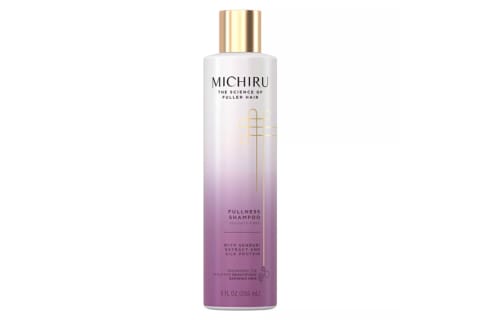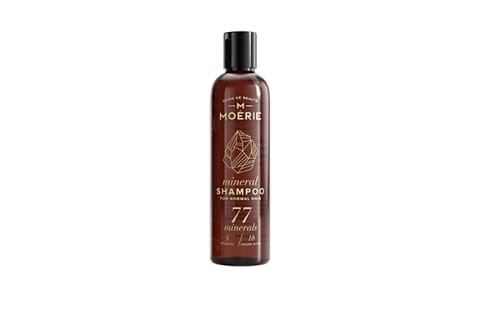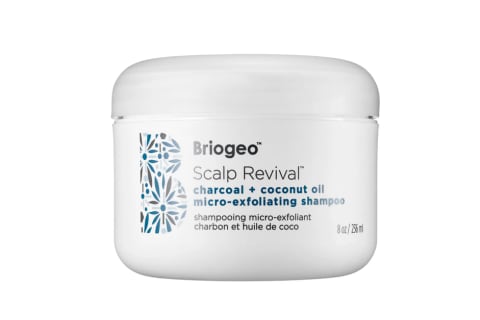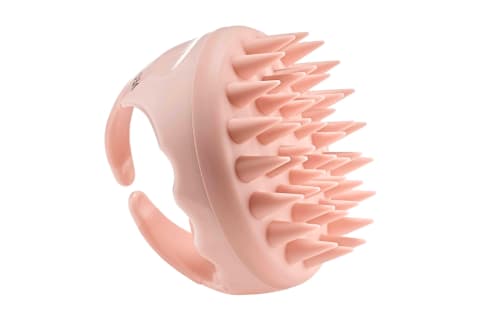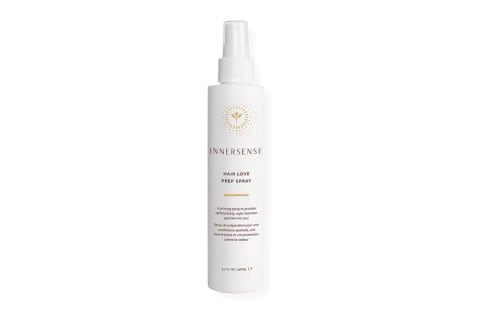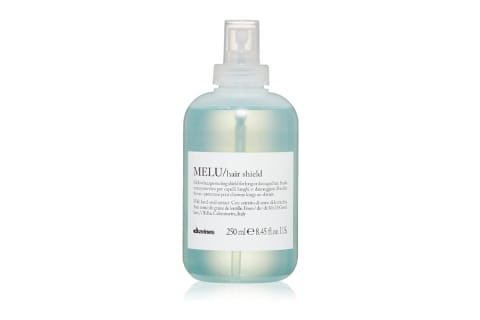Advertisement
9 Ways To Make Your Hair Thicker Naturally, According To Stylists & Nutritionists


Thick hair can be a major point of pride. Some of us have it inherently—we were born with full heads of hair and simply never seemed to lose it. For others? Well, it can take some work.
Sure, you can fake the fullness (cough, clip-in extensions) or you can get it the natural way. There's nothing wrong with the former, but we're fans of focusing on the latter.
And getting thickness really comes from a two-fold approach: Internal and external. That's why it's important to speak to hair stylists, dermatologists, and nutritionists for a well-rounded picture of hair health.
Here, our best tips.
9 ways to naturally thicken hair
Thicker hair doesn't have to be a pipe dream. Here's how to add va-va-volume:
Skip the sulfate shampoos
When it comes to thicker hair, sulfates are not your friend. These strong cleansers might give shampoos that sudsy quality, and even give the illusion of volume in the short term, but they can contribute to damage overtime. Sulfates can irritate the skin, dry out strands, and cause inflammation by disrupting the scalp's microbiome. These factors can cause increased shedding and breakage for some—especially those with naturally dry strands, curls, and coils.
"Staying clear of sulfates in a shampoo is always a good call," says Andi Scarborough, stylist and co-owner of Framed salon in Santa Monica, California. "These aggressive lathering agents can dry the hair out and strip color and natural oils."
Luckily, there are sulfate-free options for every budget—check out our favorite sulfate-free shampoos here. Or, even better, here's our favorite shampoos for hair growth.
Sulfate-free shampoo for naturally thicker hair
Don't overdo dry shampoo
Not washing your hair every day can help keep your strands conditioned (hello, natural oils!); however, always reaching for the dry shampoo can do the opposite.
"Overuse of dry shampoo is not only cheating your scalp out of the TLC it needs, but it can also cause detrimental buildup on the scalp and suffocate follicles, which can lead to thinning hair and hair loss," warns Scarbrough. "If you love a good second- (or third- or fourth-) day refresh, as I know I do, opt for a mineral-, oat-, or rice-protein-based dry shampoo."
And when it's time to wash, don't skip on that second shampoo, and scrub it like you mean it! You may even consider a scalp exfoliator to help remove buildup.
Give your scalp some love
When it comes to thicker hair, it's not just your locks that need attention. "Dry skin on your scalp or product buildup can choke out the follicle, reducing the diameter of the hair growing out, and in some cases reducing the follicle's ability to produce hair at all," says Scarbrough, who suggests a scalp scrub or scalp massager to help turn over dead skin cells and stimulate blood flow to the hair follicle.
Another proven way to increase hair thickness: Give yourself a relaxing scalp massage (just four1 minutes a day has been shown to increase hair thickness). Even better, add peppermint oil to the mix—animal research has found2 that this essential oil can actually increase the number of hair follicles when applied topically.
For a DIY scalp massage oil, simply combine a couple of drops of peppermint essential oil with argan oil. (Note: Always use your essential oils with a carrier oil.)
Scalp products for naturally thicker hair
Put the heat styling on low
Are you guilty of blasting your hair with hot hair dryers, curling wands, and straightening tools? "High-heat styling habits are another major culprit, and can essentially strip away the outside cuticle layer of the hair, or burn it, rendering it incapable of holding body or wave," warns Scarbrough, who suggests running your iron at medium heat and taking smaller sections.
Another defense: Safeguard hair before you straighten it with a nourishing heat protection spray such as the a bit of plain old argan oil. Even better, skip the tools altogether and go au naturel with these air dry techniques.
Heat protectants for naturally thicker hair
Skip the overly restrictive diets
Not getting enough nutrients3 or the right nutrients4 can affect both hair growth and fullness. That's why it's important to eat a range of healthy foods, such as nuts, seeds, fruits, vegetables, lean protein, and healthy fats. "Your body needs adequate nutrients to support healthy hair," says Jessica Cording, R.D., author of the forthcoming Little Book of Game-Changers: 50 Healthy Habits for Managing Stress & Anxiety, who warns against diets with more forbidden foods than permitted foods. "If you're only eating the same few foods, and cutting out a lot, you're setting yourself up for being deficient in certain nutrients."
Think beyond protein
"Protein is a key macronutrient in overall hair health," says McKel Hill, registered dietitian and founder of Nutrition Stripped. In fact, hair consists mainly of protein5, and research shows not getting enough can mean thinning6 hair. Just like you should eat a variety of nutrients, getting a mix of proteins can help build healthier hair. In addition to consuming the usual protein-rich foods, oysters and pumpkin seeds deliver zinc7, salmon and sardines are rich in omega-3 fatty acids8, and eggs contain biotin9—nutrients that have all been linked to hair health or growth.
Don't forget vitamin C
Vitamin-C-rich foods can act like a healthy ager for the scalp. Not only can the antioxidant protect hair follicles from free radical damage, which research shows can sabotage hair growth and thickness10, but it can encourage fuller hair. "Vitamin C plays a really big role in collagen production and that helps strengthen hair," says Cording. Citrus isn't the only super source of vitamin C, though—Brussels sprouts, broccoli, red pepper, kale, strawberries, and kiwi also deliver.
Consider a supplement
Yes, there are hair supplements out there that promise all kinds of amazing things, but do they deliver? "If you're deficient in minerals or certain vitamins involved in hair growth, it could be beneficial working with a dietitian to get you on a supplement routine," says Hill.
One supplement that may hold promise for hair growth is biotin and collagen, both of which are packed with amino acids. It's not something that will have instantaneous effects, but considering collagen's numerous full-body benefits and minimal side effects, it may be worth adding to your supplement rotation. Low levels of biotin have been linked to hair loss9, and other studies show that taking these supplements does support increased hair growth11 in women in a double-blind, placebo-controlled study. For the best collagen supplements, check our our all-time favorites.
Try PRP
"Platelet-rich plasma injections are done by drawing a patient's blood, spinning it down to separate regenerative platelets, and injecting those back into the scalp," explains board-certified dermatologist Reena Jogi, M.D. The resulting platelet-rich plasma contains growth factors that promote hair growth in the base of the follicle. "This results in decreased shedding, increased growth phase of the hair follicle, increased density of the scalp hairs, and increased thickness of the hair follicles themselves," Jogi explains.
The procedure can be a bit costly, but it works: As it's a relatively new treatment, research is still in its infancy, but the most promising of the research points to its hair regrowth properties. One randomized, placebo-controlled human trial found that after three sets of injections, the patients had significant improvement in hair density12. If you're interested, consult a board-certified dermatologist who can walk you through your options.
Why our hair thins
But first, "It's important to know that most people lose up to 100 hairs per day. If you don't regularly brush your hair, this can feel very dramatic in the shower," says Andi Scarborough, stylist and co-owner of Framed salon in Santa Monica, California.
Beyond the usual shedding, there are reasons for hair loss. "When I see clients who come to me with hair concerns, most often it's caused by high stress levels, hormonal issues, and/or a combination of lack of nutrients or not eating enough food," says Hill. Other culprits include aging, thyroid problems13, some prescription drugs14, smoking15, and genetics16.
Of course, how you treat your tresses matters too, from washing your hair with more natural products to how you style it. But as complicated as the causes may be, thicker hair solutions can be simple and even better for your hair and overall health.
Hair thinning factors:
- Stress
- Hormones
- Diet
- Age
- Genetics
- Drugs
- Lifestyle factors, like smoking
Note: Contact your health care provider if you have sudden hair loss. This can be a symptom of a health problem.
FAQ
What food is good for hair thickening?
The best foods to encourage hair growth are proteins (from either animal and plant sources), vitamin C and other antioxidants, and fatty acids. For protein, eat eggs, chicken, beans, lentils, and chickpeas. For vitamin C and antioxidants, opt for berries and citrus fruits. And for omegas, look for oils, nuts, and salmon.
Why has my hair gone so thin?
Hair thinning can be attributed to several factors. The first is it might be genetic—some folks just have naturally thin hair, or hair prone to thin with age. Outside of that, diet, stress, hair care, scalp buildup, hormones, drugs, and lifestyle habits can all contribute to thinning.
The takeaway
Getting thick hair is all about healthy choices—like sticking to natural products, eating healthy, taking supplements, and being kind to your strands.
16 Sources
- https://www.ncbi.nlm.nih.gov/pmc/articles/PMC4740347/
- https://www.ncbi.nlm.nih.gov/pmc/articles/PMC4289931/
- https://www.ncbi.nlm.nih.gov/pmc/articles/PMC5315033/
- https://www.ncbi.nlm.nih.gov/pmc/articles/PMC4389977/#B12
- https://www.ncbi.nlm.nih.gov/pmc/articles/PMC4201279/
- https://www.ncbi.nlm.nih.gov/pubmed/3120652
- https://www.ncbi.nlm.nih.gov/pmc/articles/PMC3870206/
- https://www.ncbi.nlm.nih.gov/pmc/articles/PMC6164340/
- https://www.ncbi.nlm.nih.gov/pubmed/19727438
- https://www.ncbi.nlm.nih.gov/pmc/articles/PMC2929555/
- https://www.ncbi.nlm.nih.gov/pmc/articles/PMC3509882/
- https://www.ncbi.nlm.nih.gov/pmc/articles/PMC4622412/
- https://www.ncbi.nlm.nih.gov/pmc/articles/PMC3746235/
- https://www.ncbi.nlm.nih.gov/pubmed/8018303
- https://www.ncbi.nlm.nih.gov/pubmed/12673073
- https://www.ncbi.nlm.nih.gov/pubmed/28453904
